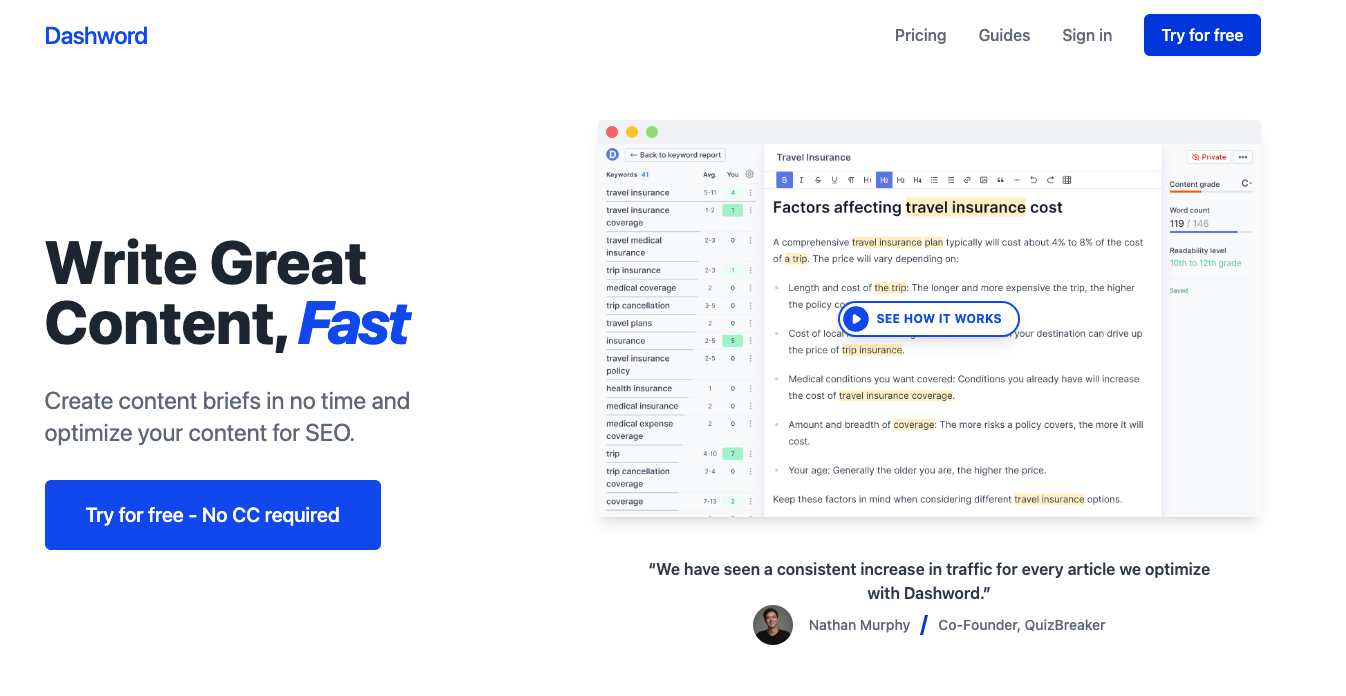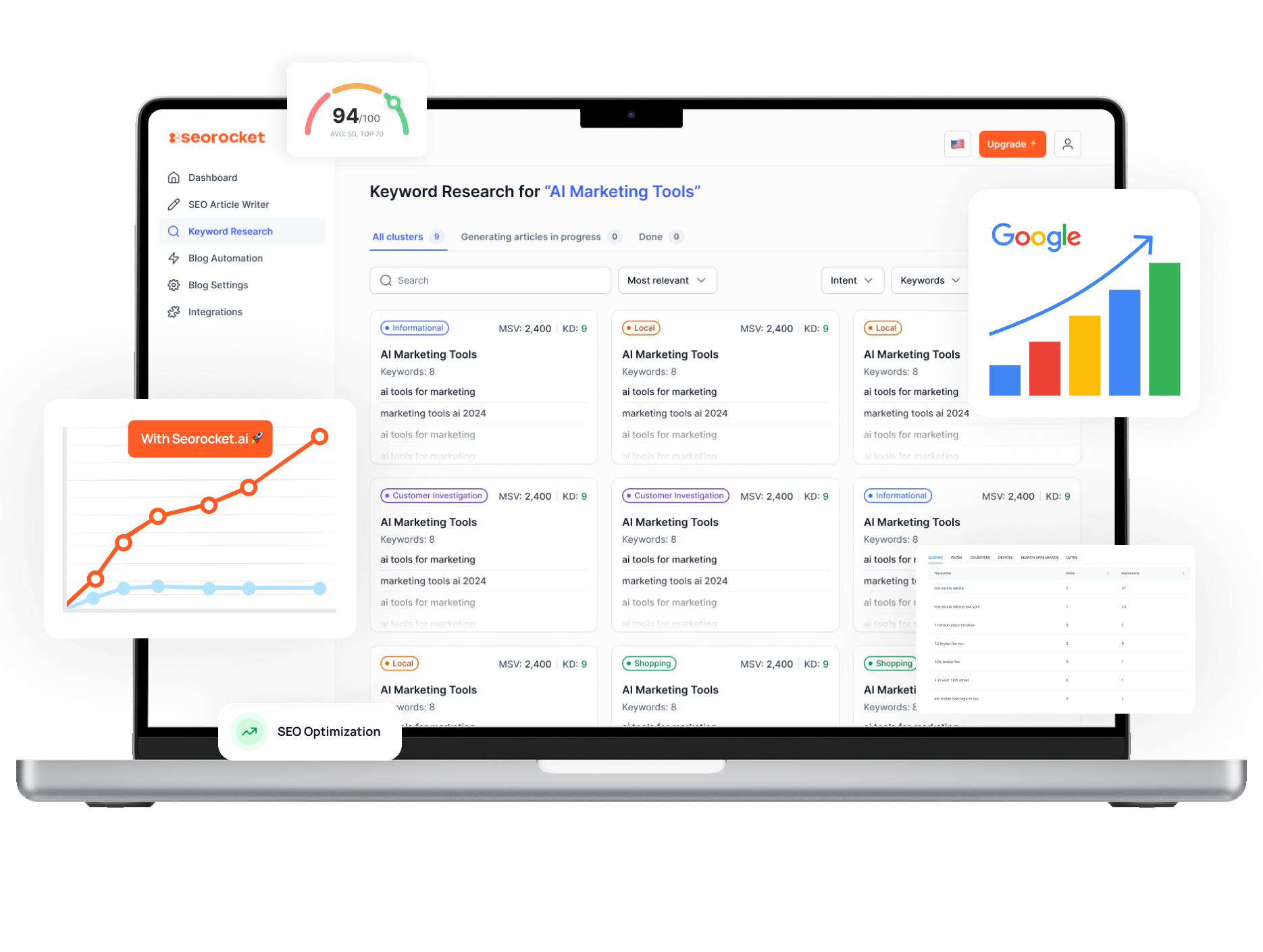Dashword and Reword are both powerful tools, but their strengths lie in different areas. We’ll help you analyze your SEO needs and choose the one that empowers you to achieve your online goals.
Comparison Dashword and Reword
In today’s competitive digital landscape, harnessing the power of SEO is non-negotiable for online success. Both Reword and Dashword offer compelling solutions to elevate your SEO game, each boasting unique strengths and catering to specific needs. This detailed comparison will dissect the core features, advantages, and potential drawbacks of each platform to help you determine the best fit for your SEO strategy.
Dashword
Dashword focuses on empowering content creators and marketers to produce high-quality, SEO-optimized content efficiently. With its intuitive content brief builder and real-time optimization suggestions, Dashword aims to elevate content quality while boosting organic visibility.
Dashword: Overview
Dashword is a content marketing platform specializing in content brief creation, SEO optimization, and content performance monitoring.

Dashword: What It Does
- Content Brief Builder: Helps create detailed briefs with keyword research, competitor analysis, and content structure suggestions.
- Content Optimization: Provides real-time feedback and scoring based on SEO best practices.
- Content Monitoring: Tracks content performance, identifies underperforming pages, and suggests updates.
Key Features of Dashword
- Competitor Content Analysis: Extracts outlines and key topics from competitor articles for inspiration and strategic content planning.
- Interactive Content Brief Builder: Facilitates collaborative brief creation with an easy-to-use interface.
- Real-Time SEO Feedback: Scores content based on keyword usage, readability, and other SEO factors.
- Automated Content Monitoring: Tracks keyword rankings, traffic trends, and alerts users to content requiring updates.
Who is Dashword For?
Content marketing teams looking to streamline their content creation process.
Businesses wanting to improve the quality and SEO performance of their content.
Agencies managing content creation for multiple clients.
Pros of Dashword
- Content Quality Focus: Emphasizes creating high-quality, well-researched content.
- Collaborative Brief Creation: Facilitates seamless teamwork on content strategy and development.
- Data-Driven Optimization: Provides clear, actionable insights to improve content performance.
- Time-Saving Automation: Automates content monitoring and reporting, freeing up time for strategic tasks.
Cons of Dashword
- Less Comprehensive SEO Features: Lacks some of the all-in-one capabilities offered by Seorocket, such as keyword research and automated publishing.
- Content Optimization Limited to On-Page Factors: Doesn’t offer tools for off-page SEO optimization like link building.
- Pricing May Be Prohibitive for Small Businesses: The Business plan, which includes content monitoring and more extensive features, might be costly for smaller companies or individual bloggers.
Streamlined content brief creation
Real-time SEO optimization feedback
Content performance monitoring and reporting
Collaborative features for teams
Not a full-fledged SEO suite
Focus primarily on on-page optimization
Pricing may be high for smaller businesses
Dashword Pricing
- Startup: $99/month
- Business: Custom pricing (starts at $349/month)

What Users Say About Dashword
Users praise Dashword for its ability to simplify content creation, improve content quality, and increase organic traffic. Many highlight the user-friendly interface and helpful content optimization suggestions.
What’s Missing in Dashword
Keyword Research Tools: Requires users to rely on external tools for comprehensive keyword research.
Content Generation Capabilities: Doesn’t offer AI-powered content writing features.
Limited Integrations: Could benefit from a wider range of integrations with popular marketing tools.
Final Thoughts on Dashword
Dashword shines as a powerful content marketing platform ideal for businesses prioritizing high-quality, SEO-optimized content. Its focus on streamlining the content creation process, providing data-driven optimization suggestions, and monitoring performance makes it a valuable asset for content-focused teams. However, companies seeking a complete SEO suite with keyword research, content generation, and a wider range of features may need to consider other platforms or supplement Dashword with additional tools.
Reword
Reword distinguishes itself by focusing on the human element of content creation, positioning its AI as a “cowriter” rather than a replacement. It emphasizes crafting high-quality, people-first articles that resonate with readers while adhering to SEO best practices.
Reword: Overview
Reword is an AI writing assistant that prioritizes collaboration between humans and artificial intelligence. It aims to enhance the content creation process by providing research, suggesting improvements, and generating text while preserving the writer’s unique voice and style.

Reword: What It Does
- AI-Powered Writing Assistance: Provides suggestions, generates text sections, and helps overcome writer’s block.
- Voice Training: Learns the user’s writing style to produce content that aligns with their brand voice.
- Research Integration: Pulls in relevant research and citations to support claims and enhance credibility.
- SEO Optimization: Analyzes content for search intent and suggests improvements for better ranking potential.
- Collaboration Features: Allows teams to work together on articles, share feedback, and maintain consistency.
Reword offers a range of features designed to elevate content quality and streamline the writing process:
Key Features of Reword
- Custom-Trained AI Cowriter: Adapts to your writing style and brand voice.
- Citation Generation: Automatically finds and adds citations to support factual claims.
- Topic Idea Generation: Provides fresh content ideas based on your niche and target audience.
- Search Intent Analysis: Ensures content aligns with what people are searching for.
- Collaborative Editing: Facilitates seamless teamwork on content creation and optimization.
Who is Reword For?
Content Writers: Enhance writing efficiency and quality with AI-powered assistance.
SEO Professionals: Optimize content for search while maintaining a natural, reader-friendly tone.
Marketing Teams: Collaborate on content creation and ensure brand consistency across all materials.
Businesses with a Strong Focus on Content Marketing: Create high-quality, engaging content that ranks well and resonates with their target audience.
Pros of Reword
- High-Quality Content: Focuses on creating well-researched, engaging, and factually accurate content.
- Preservation of Brand Voice: Learns and adapts to your unique style and tone of voice.
- Improved Research Efficiency: Streamlines the research process by providing relevant information and citations.
- Enhanced Collaboration: Facilitates seamless teamwork and feedback sharing during the content creation process.
Cons of Reword
- Limited Content Generation: While it provides assistance, Reword is not designed to fully automate content creation.
- Dependence on User Input: The quality of output depends on the user’s ability to provide clear instructions and feedback.
- Potential Learning Curve: Mastering all the features and maximizing the platform’s potential may require some time and practice.
Focus on high-quality, people-first content
Custom-trained AI for brand voice consistency
Efficient research and citation generation
Strong collaboration features
Not a fully automated content generation solution
Quality reliant on user input and guidance
Potential learning curve for optimal use
Reword Pricing
- Grow: $48/month Suitable for individuals, freelancers, or small teams with limited content needs.
- Pro: $299/month Designed for growing publishers, agencies, and larger teams requiring unlimited features and resources.
Reword offers two primary pricing plans:

What Users Say About Reword
Reword receives positive feedback from users who appreciate its collaborative approach to AI writing. Customers highlight the platform’s ability to enhance content quality, maintain brand voice, and streamline the research process.
What’s Missing in Reword
Reword could benefit from:
More Content Generation Templates: Expanding the range of templates for different content types.
Enhanced Analytics and Reporting: Providing more in-depth insights into content performance.
Integration with More Third-Party Tools: Expanding compatibility with other marketing and SEO platforms.
Final Thoughts on Reword
Reword stands out as an AI writing assistant that prioritizes collaboration and high-quality, reader-centric content. Its focus on learning your brand voice, simplifying research, and optimizing for SEO makes it an excellent choice for individuals and teams looking to enhance their content creation process while maintaining a human touch.
Dashword vs Reword: Which One Should You Choose?

Choose Dashword If:
– You prioritize creating high-quality, well-researched content and want a platform dedicated to content optimization.
– You value collaborative features and need a tool that facilitates teamwork on content strategy and creation.
– You seek data-driven insights and actionable suggestions to improve your content’s SEO performance.
Choose Reword if:
– You prioritize crafting high-quality, reader-centric content.
– You need an AI writing assistant that adapts to your brand voice.
– You value efficient research and citation generation.
– You need strong collaboration features for team-based content creation.
search engines ranking patterns to create content that dominates
searches, all without penalty risk.

Why Consider SEOrocket Over Dashword and Reword?

While Dashword and Reword AI are strong contenders in the content optimization and generation landscape, Seorocket stands out as a comprehensive and cost-effective alternative. Here’s why:
By choosing Seorocket, you can streamline your content marketing efforts, save time and resources, and achieve significant improvements in your search engine rankings.




